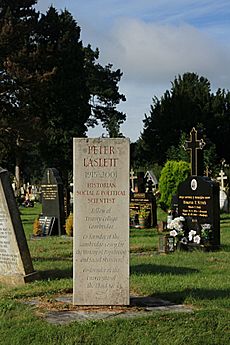Peter Laslett facts for kids
Quick facts for kids
Peter Laslett
|
|
|---|---|
| Born |
Thomas Peter Ruffell Laslett
18 December 1915 Bedford, England
|
| Died | 8 November 2001 (aged 85) Cambridge, England
|
| Alma mater | St John's College, Cambridge |
| Known for | Co-founding the Cambridge Group for the History of Population and Social Structure |
|
Notable work
|
|
| Spouse(s) |
Janet Crockett Clark
(m. 1947) |
| Scientific career | |
| Institutions | Trinity College, Cambridge |
| Notable students | Keith Wrightson Emmanuel Todd |
| Influenced |
|
Peter Laslett was an important English historian. He was born on December 18, 1915, and passed away on November 8, 2001. He was known for studying how families and societies changed over time.
Contents
Peter Laslett's Life
Peter Laslett was born in Bedford, England. His father was a Baptist minister. Peter spent much of his childhood in Oxford. He went to Watford Grammar School for Boys.
Early Education and War Service
In 1935, Peter started studying history at St John's College, Cambridge. He finished his degree in 1938 with excellent grades. After college, he continued his history research.
In 1940, during World War II, he joined the Fleet Air Arm. This was the part of the British Navy that used aircraft. He helped protect ships in the Arctic convoys. Later, he learned Japanese at a special school. He then joined the Royal Navy Volunteer Reserve as a lieutenant. His job was to help decode secret Japanese naval messages.
Peter worked at Bletchley Park, a famous secret code-breaking center. After the war ended in Europe (VE Day), he moved to Washington, D.C., in the United States. While at Bletchley Park, he met Janet Crockett Clark. They got married in 1947.
Returning to Cambridge and New Ideas
After the war, Peter returned to Cambridge in 1945. He became a research fellow at St John's College in 1948. He worked on editing the writings of an old political thinker named Robert Filmer. His work helped start a new way of studying political ideas at Cambridge.
Peter also wanted to share his knowledge with more people. He worked as a producer for BBC radio. He even helped the famous astronomer Fred Hoyle start his radio career in 1948.
One of Peter's most famous books was The World We Have Lost: England Before the Industrial Age. This book, published in 1965, was very popular. It helped people understand what life was like in England before factories and big cities changed everything.
Discovering Old Books and New Research
In 1953, Peter found a large collection of books that belonged to John Locke. Locke was a very important thinker from the past. The books were hidden away in a hunting lodge in Scotland. Peter helped arrange for these valuable books to be moved to the Bodleian Library in Oxford. This made them available for everyone to study.
Peter also continued his research on political ideas. He studied Locke's famous book, Two Treatises of Government. He showed that Locke wrote this book earlier than people thought. It was written to support a political event called the Exclusion Crisis, not just the Glorious Revolution of 1688. His edition of Locke's book is now considered the best one.
Studying Population and Families
In the early 1960s, Peter started a completely different kind of history research. He looked at old lists of people from villages in England. This made him realize how important it was to study how populations changed over time.
In 1964, Peter Laslett and Tony Wrigley started the Cambridge Group for the History of Population and Social Structure. This group studied how many people lived in different places and how families were structured in the past. They worked with volunteers to look at old records. They also started a journal called Local Population Studies.
Helping Others Learn
Peter was also interested in helping people learn throughout their lives. In the 1960s, he worked with Michael Young to create the Open University. This university allowed people to study for degrees even if they couldn't attend a traditional campus. He even hosted a TV show called "Dawn University" to show how this idea could work.
From 1966 to 1983, Peter was a professor at Cambridge University. He studied politics and how social structures changed. After he retired in 1983, he focused on understanding and helping older people. He played a key role in starting the University of the Third Age in 1982. This university helps older adults continue learning and stay active.
Peter Laslett passed away on November 8, 2001, at the age of 85. He was buried in Wolvercote Cemetery in Oxford. He is remembered for his many contributions to history and for helping people of all ages learn.
Peter Laslett's Books
Here are some of the important books Peter Laslett wrote or helped to create:
- The World We Have Lost: England Before the Industrial Age (1965)
- An Introduction to English Historical Demography: From the Sixteenth to the Nineteenth Century (with others, 1966)
- Household and Family in Past Time (edited with Richard Wall, 1972)
- Family Life and Illicit Love in Earlier Generations: Essays in Historical Sociology (1977)
- Statistical Studies of Historical Social Structure (with others, 1978)
- Bastardy and its Comparative History: Studies in the History of Illegitimacy and Marital Nonconformism (co-edited with others, 1980)
- The World We Have Lost: Further Explored (1983)
- Family Forms in Historic Europe (edited by Richard Wall, 1983)
- A Fresh Map of Life: The Emergence of the Third Age (1989)
- Justice Between Age Groups and Generations (co-edited with James S. Fishkin, 1992)
- Aging in the Past: Demography, Society, and Old Age (co-edited with David Kertzer, 1995)
 | Claudette Colvin |
 | Myrlie Evers-Williams |
 | Alberta Odell Jones |


